For the 2025 school year, there is 1 public preschool serving 440 students in Manson Northwest Webster Comm School District. This district's average pre testing ranking is 9/10, which is in the top 20% of public pre schools in Iowa.
Public Preschool in Manson Northwest Webster Comm School District have an average math proficiency score of 82% (versus the Iowa public pre school average of 70%), and reading proficiency score of 77% (versus the 69% statewide average).
Minority enrollment is 8% of the student body (majority Hispanic), which is less than the Iowa public preschool average of 27% (majority Hispanic).
Overview
This School District
This State (IA)
# Schools
2 Schools
474 Schools
# Students
793 Students
151,894 Students
# Teachers
51 Teachers
11,053 Teachers
Student : Teacher Ratio
16:1
16:1
District Rank
Manson Northwest Webster Comm School District, which is ranked within the bottom 50% of all 325 school districts in Iowa (based off of combined math and reading proficiency testing data) for the 2021-2022 school year.
The school district's graduation rate of 90% has stayed relatively flat over five school years.
Overall District Rank
#255 out of 327 school districts
(Bottom 50%)
(Bottom 50%)
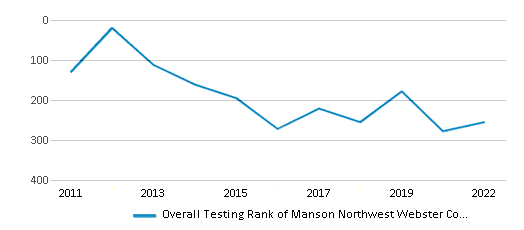
Math Test Scores (% Proficient)
63%
64%
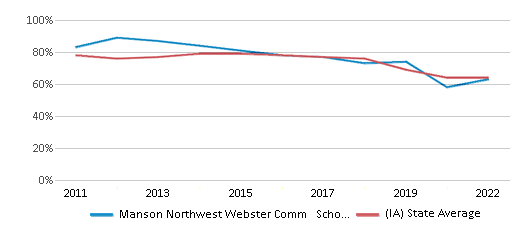
Reading/Language Arts Test Scores (% Proficient)
62%
70%
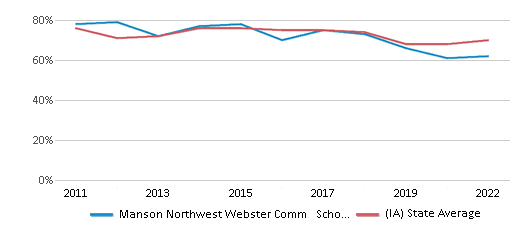
Science Test Scores (% Proficient)
50-54%
63%
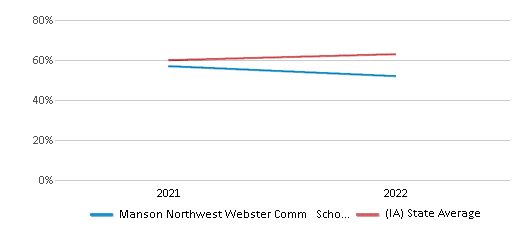
Graduation Rate
≥90%
90%
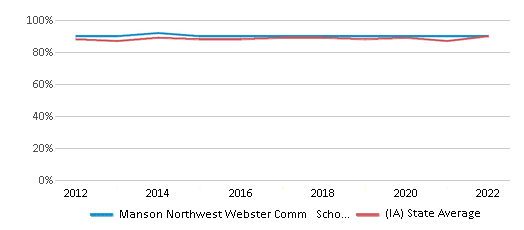
Students by Ethnicity:
Diversity Score
0.16
0.45
# American Indian Students
4 Students
532 Students
% American Indian Students
1%
n/a
# Asian Students
2 Students
2,925 Students
% Asian Students
n/a
2%
# Hispanic Students
26 Students
18,818 Students
% Hispanic Students
3%
13%
# Black Students
3 Students
9,688 Students
% Black Students
n/a
6%
# White Students
726 Students
111,231 Students
% White Students
92%
73%
# Hawaiian Students
n/a
1,189 Students
% Hawaiian Students
n/a
1%
# Two or more races Students
32 Students
7,501 Students
% of Two or more races Students
4%
5%
Students by Grade:
# Students in PK Grade:
72
23,036
# Students in K Grade:
53
25,738
# Students in 1st Grade:
58
22,613
# Students in 2nd Grade:
40
21,812
# Students in 3rd Grade:
66
20,001
# Students in 4th Grade:
40
18,600
# Students in 5th Grade:
65
14,277
# Students in 6th Grade:
46
5,389
# Students in 7th Grade:
57
67
# Students in 8th Grade:
52
108
# Students in 9th Grade:
64
31
# Students in 10th Grade:
60
54
# Students in 11th Grade:
64
71
# Students in 12th Grade:
56
97
# Ungraded Students:
-
-
District Revenue and Spending
The revenue/student of $14,492 in this school district is less than the state median of $16,468. The school district revenue/student has stayed relatively flat over four school years.
The school district's spending/student of $12,308 is less than the state median of $16,042. The school district spending/student has stayed relatively flat over four school years.
Total Revenue
$12 MM
$8,262 MM
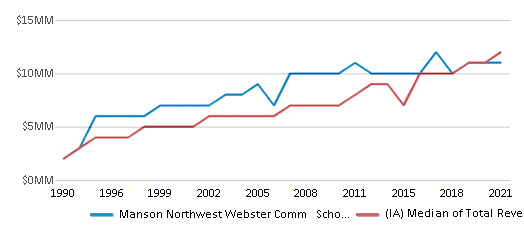
Spending
$10 MM
$8,048 MM
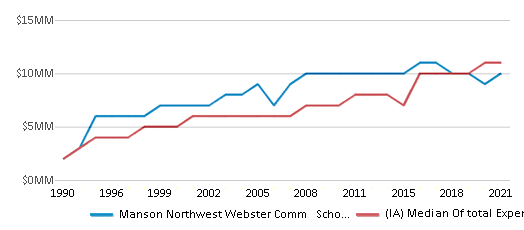
Revenue / Student
$14,492
$16,468
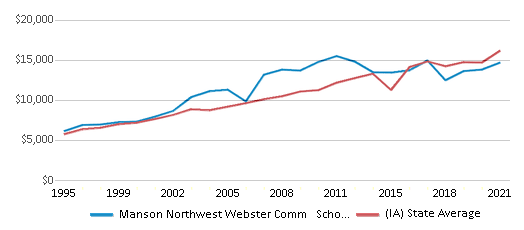
Spending / Student
$12,308
$16,042
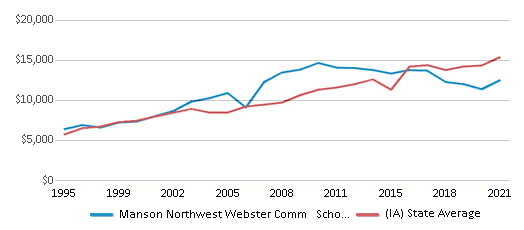
Best Manson Northwest Webster Comm School District Public Preschools (2025)
School
(Math and Reading Proficiency)
(Math and Reading Proficiency)
Location
Grades
Students
Rank: #11.
Manson Northwest Webster Elementary School
(Math: 80-84% | Reading: 75-79%)
Rank:
Rank:
9/
Top 20%10
303 Pierce Street
Barnum, IA 50518
(515) 542-3211
Barnum, IA 50518
(515) 542-3211
Grades: PK-6
| 440 students
Recent Articles

What Is A Charter School?
Explore the world of charter schools in this comprehensive guide. Learn about their history, how they operate, and the pros and cons of this educational innovation. Discover key facts about charter schools, including admission policies, demographics, and funding, as well as what to look for when considering a charter school for your child.

10 Reasons Why High School Sports Benefit Students
Discover the 10 compelling reasons why high school sports are beneficial for students. This comprehensive article explores how athletics enhance academic performance, foster personal growth, and develop crucial life skills. From improved fitness and time management to leadership development and community representation, learn why participating in high school sports can be a game-changer for students' overall success and well-being.

February 05, 2025
Understanding the U.S. Department of Education: Structure, Impact, and EvolutionWe explore how the Department of Education shapes American education, from its cabinet-level leadership to its impact on millions of students, written for general audiences seeking clarity on this vital institution.





